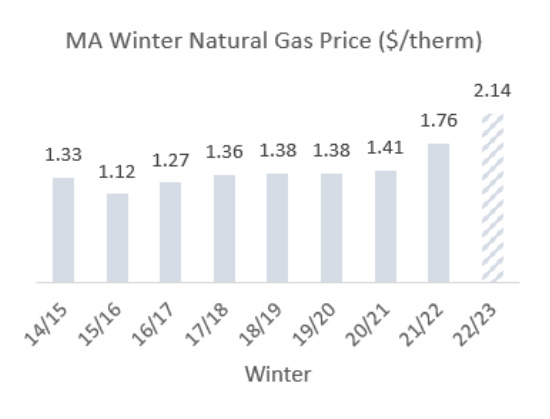As prices soar, the fossil fuel industry looks after its interests on Beacon Hill
Massachusetts' 2022 fossil fuel lobbying year in review
As gas prices and heating costs skyrocket across Massachusetts, fossil fuel producers and providers are spending hundreds of thousands to promote their political agendas to state legislators and officials.
The state’s five for-profit utilities, which function as regulated monopolies responsible for distributing gas and electricity to residents, cumulatively spent over a million dollars on lobbying in 2022. This was a 17 percent increase compared to 2021, and a 25 percent increase compared to 2020.
Meanwhile, other companies and business groups profiting from the sale and distribution of fossil fuels, including the Associated Industries of Massachusetts, Shell Oil Company, Kinder Morgan, Enbridge, and the American Petroleum Institute also maintained expensive lobbying operations focused on climate and energy policy in the Commonwealth.
As the lobbying industry booms, the cost of residential natural gas heating this winter is projected to be about 28% higher than last winter, continuing a two-year trend of rapidly increasing natural gas prices. Since the winter of 2020/2021, the winter cost of natural gas in the state has a projected increase of over 50%.

According to Massachusetts law, lobbying includes any attempts to influence state officials on matters of regulation, legislation, rules, standards, or general policy, or attempts to influence elected state officials on bills yet to be passed.
Gas utilities used their lobbying operations in 2022 to oppose bills promoting solar energy, heating electrification, gas safety, ratepayer protections, and community representation in utility proceedings.
While utilities are prohibited from including their lobbying expenses in the heating bills of residents across the Commonwealth, there are a few loopholes that can be exploited—if a utility can prove that the lobbying directly benefits ratepayers, it could be included in the rates the utility charges. Utilities have also previously pushed the state to include in their rates funding for business organizations or trade groups—which exist in part to pursue shared political goals.
It is up to the state’s Department of Public Utilities (DPU) to determine what expenses the utilities can and cannot include in their rates, which customers in a utility’s service territory are required to pay if they want to keep their heat and electricity running.
“Of course, the utility will always say that their lobbying benefits ratepayers. The question is if the DPU allows that argument to stand,” noted David Pomerantz, the executive director of the Energy and Policy Institute, a utility watchdog organization.
“Utility rate cases where this is all decided are voluminous, months-long affairs and it's easy for regulators to miss certain costs, or to decide there are bigger issues to fight with the utility about,” he added. “And some regulators are more or less inclined to fight with the utility in the first place.”
Friends in high places
The two largest gas and electric utilities in the state, National Grid and Eversource, both spent hundreds of thousands on their lobbying operations. Eversource spent a total of $360,000, while National Grid spent over $400,000.
The utilities have historically been the most influential industry on climate and energy policy in the state and have powerful allies with their own significant lobbying operations, including the Associated Industries of Massachusetts (AIM).
AIM promotes itself as “the state’s largest business association serving the needs of more than 3,400 businesses,” and its dues-paying members include utilities National Grid, Eversource, and Unitil. Other AIM members include fossil fuel industry appendages like Enbridge and the American Petroleum Institute, a notorious funder of deliberate climate misinformation.
AIM spent over $300,000 on its lobbying operation in 2023, which included lobbying on the legislative session’s major clean energy bill, along with executive lobbying on a host of energy issues.
Not all of AIM’s lobbying was focused on issues directly related to energy; other AIM lobbying activity included their opposition to various bills closing tax loopholes, limiting executive compensation, promoting housing for all, and criminalizing sexual assault by medical professionals.
While the state’s gas providers were some of the highest spenders on lobbying, they were certainly not alone among their allies in the fossil fuel industry. Shell Oil Company spent $268,000 on lobbying in 2022, their first registered lobbying operation in Massachusetts since 2009.
This comes as Shell raked in record profits of nearly $40 billion in 2022, thanks to soaring prices at the pump. While other oil majors (or carbon majors, for their hard work triggering the global climate crisis) did not have their own lobbying operations in the state, the American Petroleum Institute — whose members include majors ExxonMobil, Chevron, BP, and Shell — spent over $60,000 on its own lobbying operation.
Elsewhere, gas pipeline companies Kinder Morgan and Enbridge spent $120,000 and $60,000 on their respective lobbying operations. The American Fuels and Petrochemical Manufacturer Association (which keeps its membership private but includes executives from Chevron, ExxonMobil, and Phillips 66 on its board) spent $78,000, while the Massachusetts Energy Marketers Association (whose member list includes the American Petroleum Institute) and the Propane Gas Association of New England respectively spent $43,200 and $34,008.
NextEra, which functions as a supplier for electricity aggregation programs in 23 towns across the state, spent $155,000 on its own lobbying operation. NextEra has recently been embroiled in scandal after its Florida subsidiary was caught spending millions to fund “ghost candidates” trying to siphon votes away from Democratic candidates, aiding in the utility’s push to weaken solar programs in the Sunshine State.
Finally, the fossil fuel industry isn’t alone in its lobbying against climate action. One notable ally, the state’s real estate industry, has also been a powerful voice against climate policy, and spent accordingly on lobbying. NAIOP Massachusetts, which represents commercial real estate developers, spent over $250,000 on lobbying, opposing a wide array of climate bills promoting sustainable development, building decarbonization, and solar energy.
Meager investments in renewables
When considering lobbying from companies that are directly profiting from the sale or transport of fossil fuels, it’s important to note that some of these groups also have a financial stake in certain types of clean energy technology.
For example, Shell is co-developing the SouthCoast Wind project (formerly Mayflower Wind) off the South Coast of Massachusetts. But the vast majority of the company’s investments remain in fossil fuel production—despite extensive marketing campaigns to bolster their renewable energy credentials, only about 1.5% of the company’s capital expenditures are actually devoted to renewable energy, according to a report by nonprofit watchdog organization Global Witness. And despite record 2023 profits, the company recently announced that it will not be increasing its investments into clean energy.
Eversource and National Grid, which operate the bulk of the state’s electrical grid and gas distribution system, also have made investments in offshore wind in the region.
But at the same time, the companies are proposing to build additional gas pipelines in the state, while fighting efforts to phase out the state's gas infrastructure. In Eversource’s own decarbonization plan to the DPU, the company acknowledged that it expects the gas system to continue to grow in the coming years.
Ultimately, companies that are able to spend hundreds of thousands to meet with key regulators and legislators will have an outsized impact on the state’s transition off of fossil fuels. Thanks to the rampant inequalities baked into our economic system, this means that fossil fuel interests typically are able to outspend environmental groups several times over, even in a progressive state like Massachusetts.
What fossil fuel lobbyists are doing with officials and legislators behind closed doors is mostly a matter of speculation, thanks to the limited transparency requirements in the state. But gas utilities and fossil fuel companies have a major financial stake in Massachusetts’ continued reliance on fossil fuels, and there is little reason to think they’ve suddenly stopped working to protect their financial interests.
Climate News Roundup
Connecticut
Some Connecticut residents are seeing their utility bills nearly double this winter (Luther Turmelle — CT Insider)
Maine
Despite fossil fuel industry propaganda that electric heat pumps don’t work in cold climates, heat pumps are booming in Maine (Anna Phillips — The Washington Post)
Massachusetts
As Eversource continues construction on its deeply unpopular substation in East Boston, the company is looking to charge ratepayers for the costs associated with its community benefits agreement with the neighborhood (Miriam Wasser — WBUR)
New Hampshire
Several key energy bills are heading to state’s House of Representatives without recommendations from the Science, Technology and Energy Committee (Bob Sanders — NH Business Review)
Rhode Island
The Rhode Island Public Utilities Commission is beginning its investigation into the future of natural gas in the state, with options including the decommissioning of the state’s gas system (Mary Serreze — Providence Business First)
Vermont
Vermont’s Republican Governor Phil Scott has backpedaled some of his administration’s urgency on climate action (Brian Shupe — VT Digger)
Across the Region and Beyond!
According to a new study, fossil fuel industry trade groups outspent clean energy industry groups by a whopping 27 to 1 margin from 2008 to 2018 (Christian Downie and Robert Brulle — The Conversation)




